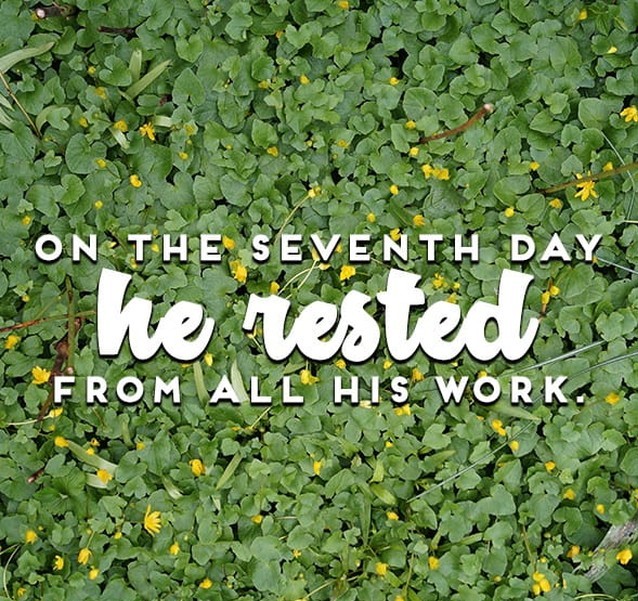
INFORMATIVE ARTICLE: Is Keeping Sabbath Still Relevant to Christians Today?
What is the Sabbath?
A regular, rhythmic time of rest is right there in the opening story of Scripture. Before humans turned away from God, before God established his partnership with the nation of Israel, a pattern of resting on the seventh day was established by God (Genesis 2:2-3).
So what does keeping the Sabbath mean for God’s people today? Are Christians supposed to observe the Sabbath? And if so, how? Why would we observe the commandment to “remember the Sabbath” if we don’t have to live by some of the more curious laws in the Bible (such as those about moldy fabric or which insects to eat)?
The Origins of Sabbath
Before we answer that question, let’s take a quick look at the idea of Sabbath rest in the Hebrew Scriptures (the Old Testament). There are two main Hebrew words used for rest in the Bible. The first is shabbat, which gets partially translated into the English word sabbath. This word for rest simply means to “stop working.” Think of an hourly job where you clock out at the end of a shift. The work is done; there’s no more until you clock back in.
The other main Hebrew word for rest used in the Hebrew Scriptures is nuakh. This means to “dwell” or “settle.” This is not the same as clocking out from an hourly job. This type of rest is like sitting in front of a fire with a loved one or unpacking a suitcase to stay at grandma’s house for the holidays. It’s essentially about being restfully present.
God sets up shabbat and nuakh right around the same time. In the Bible’s account of creation, God works for six days creating the world and rests on the seventh day (Genesis 2:2-3). After six days of bringing order to chaos, now it is time to shabbat from this work. Only a few verses later, we read that God creates humans and then immediately “rests them” or “settles them” with himself in the garden of Eden (nuakh) (Genesis 2:15) . It seems like the ideas of shabbat and nuakh are meant to work together. God leads by example as he rests from work (shabbat) and then dwells together (nuakh) with his people. How will the rest of the story go?
The Interplay of Sabbath and Rest in the Hebrew Scriptures
This beautiful rhythm of rest doesn’t last very long. In the history of God’s chosen people–the nation of Israel–, there are constant failures to shabbat well (Ezekiel 20:12-13, Jeremiah 17: 27). God’s people worship scores of false gods, ignore his good designs for them, and rebel in just about every way possible. God rests, or nuakhs, his presence with them anyway through the tabernacle and later the temple (Exodus 40:34, Chronicles 5:14). These little pockets of God’s divine presence have echoes of the original garden of Eden where God and his people dwell together. This is the intention of the first, original Sabbath. It was so God and his people could rest in their relationship. It’s a glorious picture that leaves us wanting more. Will Sabbath rest ever be restored? Let’s jump ahead and find out.
Does Jesus Keep the Sabbath?
In the New Testament, we see the clearest picture of God’s presence taking up space on earth and dwelling with God’s people in the person of Jesus. The Gospel tells us that Jesus had a lot to say about the Sabbath and the true rest that God intends for his people.
Let’s take a look at an example from the Gospel of Matthew. Matthew sets up for his readers a series of connected stories where Jesus is confronted by Israel’s religious leaders and teachers. In one particular instance on the Sabbath day, the leaders object to Jesus’ friends picking corn as they’re walking through a field (Matthew 12:1-2)and to Jesus healing a man’s shriveled hand (Matthew 12:9-14). Was Jesus ignoring the command to keep the Sabbath found in the Hebrew Scriptures (Exodus 20:5, Deuteronomy 5:15)
Jesus responds with an argument that redefines the Sabbath, asserts his role as the promised Messiah, and points to his divinity (Matthew 12:3-8). The Pharisees are understandably upset by this. But to Jesus, Sabbath observance pointed to something greater.
Jesus Points Beyond a Sabbath Day
Matthew tells these stories about Sabbath controversies immediately after quoting Jesus’ words about rest:
“Come to me, all you who are weary and burdened, and I will give you rest. Take my yoke upon you and learn from me, for I am gentle and humble in heart, and you will find rest for your souls.”(Matthew 11: 28-30)
All this talk of rest right before a passage that deals with Sabbath? This is no mistake. What is Matthew trying to communicate here?
It seems that God’s people had become weary and burdened by the heavy weight of observing the Sabbath, and Jesus hoped to redefine the meaning of Sabbath for them. The people were in need of rest, both in ceasing from hard work (shabbat) and being present together with God (nuakh). Jesus ushered in the promise and reality of both.
Jesus reminded the people of God’s actual intent for the Sabbath: unity with God, creation, and each other that was first found in Eden on page one of the Bible. Jesus taught that the Sabbath was about mercy and was purposeful. It was supposed to point to him, the one promised through all of Israel’s prophets, the one who would restore the rhythm of creation. When followers of Jesus observe the Sabbath, we live as if this restoration has already taken place. We take a break from the broken rhythms of hustle and hardship to set aside a time of submission to his rule and enjoyment of his presence and to extend these things to the world around us. When we observe the Sabbath well, we become little resting places of God’s presence.
Keeping the Sabbath: What Does it Mean to Rest Today?
So what does this look like practically? Does it mean attending a weekend church service, or turning off work emails, or volunteering at a soup kitchen? Does it matter what day you observe Sabbath? Your Sabbath could certainly include those activities, and it could take place on the same day every week! But the text seems to emphasize the purpose of the Sabbath, rather than telling us rules for how to observe it.
As followers of Jesus, we aren’t…Continue Reading@https://bibleproject.com
.
.
If you found this post helpful, we would be honored if you would share it.
If you are NEW HERE, please check out our about-circ-blog/ page and read to know a little more about CIRC BLOG Or Click here for recent posts.
If you are interested in submitting soul-nurturing articles or books for all of us to benefit from, please contact CIRC BLOG Admin via circ.community@emoltem.com
Are you willing to share with us how we can improve or have a problem on the site or a post, please contact CIRC BLOG Admin via circ.community@emoltem.com
Thank you for reading, sharing, and being a part of CIRC BLOG!
.
Would you like to give OR re-dedicate your life to JESUS CHRIST, but you don’t know HOW?
.
Please READOUT LOUD below Prayer and contact us @ circ.community@emoltem.com for more information.
“Dear Lord Jesus, I know I am a sinner, and I ask for Your forgiveness. I believe You died for my sins and rose from the dead. I turn from my sins and invite You to come into my heart and life. I want to trust and follow You as my Lord and Savior and to yield back the life given to me by You, back to You. Take Control of my life Lord, and let only your will be done in my life from now on. Amen.”

